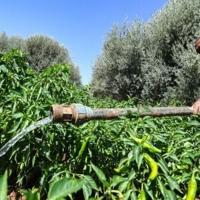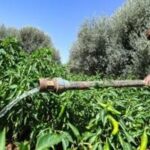Showing parched crops on one side and lush green plants on the other, a small farming project in northwest Tunisia highlights how foreign funding and local efforts are addressing the impact of climate change.
Saida Zouaoui, a woman farmer, built a local dam in the village of Ghardimaou with European Union funding and technical support from the International Labour Organization. This project has made her a local hero among smallholders, who have seen increased production despite a six-year drought.
The upcoming COP29 climate summit in Azerbaijan will address global funding to help vulnerable nations cope with climate change. However, disagreements persist over the amount and sources of funding.
“We must adapt to climate change,” said Zouaoui, emphasizing the importance of finding solutions amidst water-related challenges in the region.
Previously, Zouaoui’s father and grandfather attempted to build a reservoir in their village using sandbags, but the lack of infrastructure and resources led to failure. This inspired Zouaoui to pursue the construction of the dam.
– EU funding –
Tunisia, already one of the most water-stressed countries, has seen its national dams decrease in capacity. Zouaoui’s dam has helped to provide irrigation for local farmers and has rejuvenated the agricultural sector in the village.
Supported by EU funding, the construction of the dam was a joint effort involving local farmers and authorities. The EU has allocated substantial funds to support agricultural and water management projects in Tunisia.
– ‘Changed my life’ –
Zouaoui’s initiative has been lauded as a model of local development by the International Labour Organization. The project not only addresses climate change but also creates employment opportunities in marginalized areas.
Through Zouaoui’s dam, farmers have regained hope and have expanded their agricultural activities. The project has had a transformative impact on the lives of many villagers, enabling them to support their families through increased crop production.





